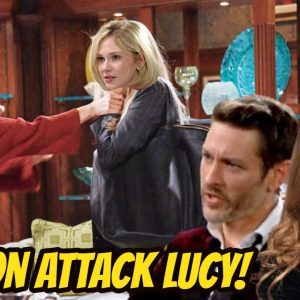In the intricate web of Genoa City’s relationships, few tales are as twisted and emotionally charged as
that of Billy Abbott, Chelsea Lawson, and Adam Newman. Recent revelations about Chelsea’s infidelity have left Billy shattered, turning his plans for the future dark and vengeful.
Billy had placed immense faith in the promises he and Chelsea made, especially their vow to marry by year’s end. His anticipation for their wedding was not just about the ceremony but about building a life together with Chelsea, whom he loved deeply. However, discovering Chelsea’s betrayal with Adam has demolished his trust, leaving him seething with anger and betrayal.
Chelsea, meanwhile, viewed Billy as a safety net, a fallback if things with Adam didn’t pan out. She never truly committed to Billy the way he did to her. With Adam’s recent behavior—dodging responsibility and distancing himself—Chelsea’s primary plan has unraveled, and she’s left clinging to Billy for security .
.
Billy’s reaction isn’t an immediate confrontation. Instead, he concocts a revenge plan that is both calculated and cruel. He decides to wait until their wedding day to expose Chelsea’s infidelity, aiming to humiliate her in front of everyone they know. The thought of Chelsea in her wedding dress, expecting to start a new chapter, only to be publicly shamed, fills Billy with a mix of satisfaction and regret.
Viewers familiar with Chelsea’s manipulative tendencies might feel she deserves such a fate. They see Billy as a good man who loved her genuinely, making her betrayal seem worthy of retribution. However, the morality of Billy’s plan is complex. Is it justifiable to exact such a harsh punishment, even on someone who has wronged you? The spectacle of public humiliation on a day meant for joy and celebration raises ethical questions about revenge.
Billy’s life is further complicated by his professional challenges. His demanding work leaves him exhausted and unable to fully process his emotions regarding Chelsea. This exhaustion fuels his decision to maintain the facade of their relationship while secretly planning its dramatic end.
While Billy’s plan is emotionally understandable, it is undeniably harsh. To expose Chelsea’s betrayal on their wedding day, when she is most vulnerable, could be seen as excessively cruel. It would devastate Chelsea and leave a lasting impact on their families and friends, who would unwittingly witness the drama.
Psychologically, Billy’s plan can be viewed as a way to regain control in a situation where he felt powerless. Chelsea’s betrayal stripped him of his agency in their relationship, and by orchestrating this public revelation, he seeks to reclaim it. However, revenge often carries unforeseen consequences. The emotional toll on Billy himself, the potential collateral damage to others, and the long-term repercussions on his own psyche are factors he may not have fully considered.
As Billy navigates this emotional minefield, he must also contend with his professional responsibilities. The stress of his job compounds the stress of his personal life, creating a situation where he is perpetually on edge. His decision to delay the breakup while continuing to play the role of Chelsea’s loving partner adds another layer of complexity.
Ultimately, Billy’s plan reflects a deeper struggle within himself. He is torn between his love for Chelsea, his sense of betrayal, and his desire for justice. Whether he follows through with his plan will depend on his ability to balance these conflicting emotions and consider the potential consequences of his actions.
In the end, the story of Billy, Chelsea, and Adam serves as a poignant reminder of the complexities of human relationships. It highlights the fine line between love and hate, the destructive power of betrayal, and the often painful consequences of seeking revenge. As the residents of Genoa City watch this drama unfold, they are reminded that in matters of the heart, there are rarely easy answers or clear-cut resolutions.





